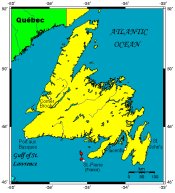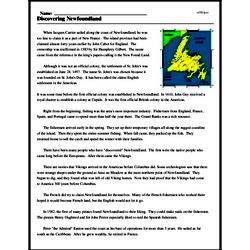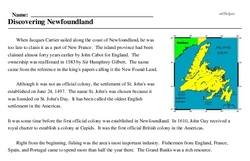Discovering Newfoundland
Newfoundland Discovery Day
Reading Comprehension for June 24
When Jacques Cartier sailed along the coast of Newfoundland, he was too late to claim it as a part of New France. The island province had been claimed almost forty years earlier by John Cabot for England. The ownership was reaffirmed in 1583 by Sir Humphrey Gilbert. The name came from the reference in the king's papers calling it the New Found Land.
Although it was not an official colony, the settlement of St. John's was established on June 24, 1497. The name St. John's was chosen because it was founded on St. John's Day. It has been called the oldest English settlement in the Americas.
It was some time before the first official colony was established in Newfoundland. In 1610, John Guy received a royal charter to establish a colony at Cupids. It was the first official British colony in the Americas.
Right from the beginning, fishing was the area's most important industry. Fishermen from England, France, Spain, and Portugal came to spend more than half the year there. The Grand Banks was a rich resource.
The fishermen arrived early in the spring. They set up their temporary villages all along the rugged coastline of the island. Then they spent the entire summer fishing. When fall came, they packed up the fish. They returned home to sell the catch and spend the winter with their families.




